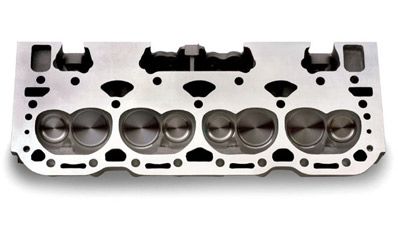
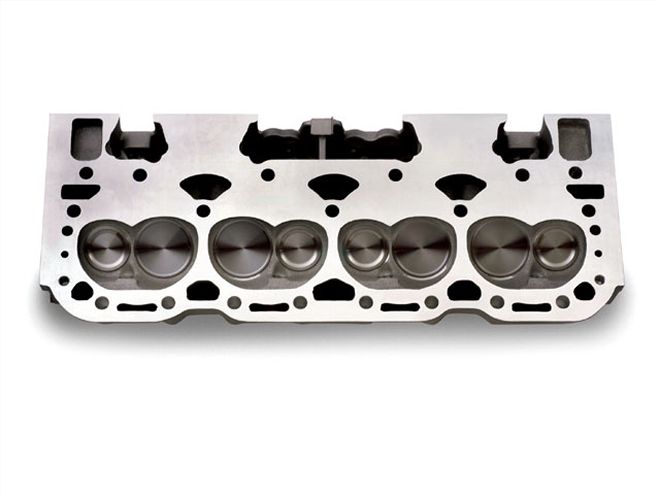 Chevy's Fast Burn aluminum cylinder head works with either standard or Vortec intakes and is an improvement over stock iron heads with raised runners and small combustion chambers. Courtesy of GMPP
Chevy's Fast Burn aluminum cylinder head works with either standard or Vortec intakes and is an improvement over stock iron heads with raised runners and small combustion chambers. Courtesy of GMPP
Why bother with the extra expense of racing a set of aluminum cylinder heads instead of the much more common (and cheaper) cast-iron cylinder heads when the rule book allows you your choice of either? Where is the advantage? After all, you can get the same combustion chamber shape and runner volume in a set of cheaper cast-iron heads, right?
Well yes, but that's largely missing the point. Many people new to racing understand that aluminum is lighter than cast iron, but don't realize how much of a difference it can make when you are talking about a pair of cylinder heads. On a Chevy small-block, we are talking about shaving between 40 and 50 pounds of dead weight by switching from iron to aluminum. Yes, your car still has to meet a minimum weight on the scales, but now that weight-which was way up high on your car and adding a lot of nose weight-can be transferred to lead that's stashed away in the framerails and positioned exactly where you need it.
Another reason is whenever any port work is allowed-either by hand or by a CNC machine-shaving chunks off a piece of aluminum is always easier and quicker than working with the much harder iron. And you can guess the result: It always costs less to port an aluminum head versus its iron brother. In fact, it can sometimes be difficult to find ported iron heads in the specs you need. You either go as-cast, or you go aluminum.
A final advantage to aluminum is it transfers heat much more efficiently than iron. This means that an aluminum cylinder head can much more quickly pull heat out of the combustion chamber and transfer it to the coolant in the water jackets. For years, magazines have claimed that this means you can run more timing in your ignition when running aluminum heads, but this isn't always proven to be true on the dyno. Still, it doesn't hurt, and aluminum heads can provide a measure of detonation protection on the racetrack.
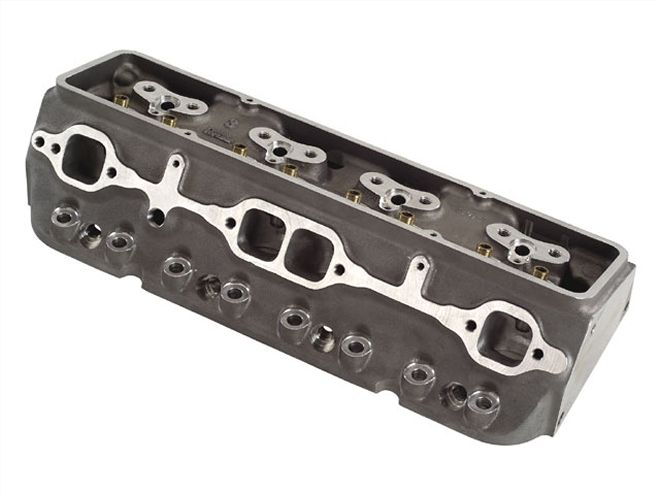 Racing Head Service's Pro Action line of aluminum cylinder heads for the Chevy small-block are available either as-cast or cut on CNC machinery. Courtesy of RHS
Racing Head Service's Pro Action line of aluminum cylinder heads for the Chevy small-block are available either as-cast or cut on CNC machinery. Courtesy of RHS
A few precautions should be taken during the installation of aluminum heads. The metal is softer, so make sure it is properly protected at some of the cylinder head's most abused areas. This primarily means hardened valve seats. In an iron head, you can usually get by with flame-hardened seats, but any aluminum heads you purchase should have hardened seat inserts. The most common for racing is a copper-beryllium alloy that's easily spotted because of its copper color.
The top of the cylinder head also requires a little protection where the springs meet the head. Hard steel valvesprings can cut into the aluminum, causing valvetrain geometry problems and early spring and valve stem failures. The fix is simple here. Hardened steel valvespring seats are easily installed-just make sure you account for the reduced spring height. The height of the seat is only a few thousandths, but that can make a difference in terms of spring pressure and the amount the valve can be opened before the spring goes into coil-bind. Steel valve stems will also quickly wear aluminum, so you should also make sure you have valveguide inserts installed. Bronze guides work best here.
Finally, there are installation issues. Almost all quality head bolt kits come with washers. If you come across a set that does not, keep it away from your aluminum heads. The washers keep the underside of the head of the bolt from galling against the aluminum and throwing off your torque readings. If you are installing aluminum heads on a cast-iron block, the difference in expansion rates can cause sealing problems. Because of this, composite gaskets seem to work best. There are different designs available. Just make sure whatever you use is applicable in an aluminum-head/iron-block situation.
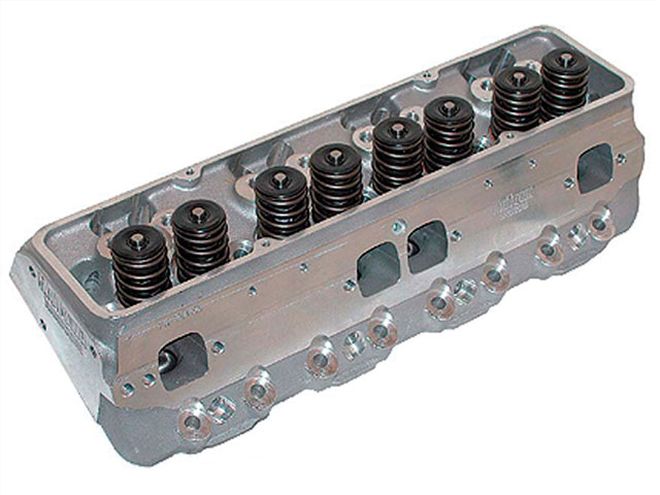 One of the benefits of a CNC-machined cylinder head, such as this Motown Lite from World Products, is that the machining processes are all registered from a consistent point, so core shift variables are virtually eliminated. Courtesy of World Products
One of the benefits of a CNC-machined cylinder head, such as this Motown Lite from World Products, is that the machining processes are all registered from a consistent point, so core shift variables are virtually eliminated. Courtesy of World Products
As it was with our cast-iron roundup, we are sticking with what is by far the most common option available for racers-the small-block 23-degree Chevy head. This time, however, we are dealing with as-cast and CNC-ported heads (when available).
Chevrolet's pickings are a little slim when it comes to aluminum heads for stock car racing. The head most commonly allowed by the rule books is the famous Fast Burn cylinder head. This is a fully machined head with dual bolt patterns for early-model and Vortec intake manifolds. Maximum valve lift is 0.530 without modifications.
Click here for a list of Chevrolet cylinder heads
Pro Action 23-degree SBC cylinder heads feature specially designed runners and combustion chambers (available in 50cc, 64cc, and 72cc volumes) to maximize volume, atomization, and velocity. Improved valve guide material yields tighter tolerances and extended durability. Available in aluminum or iron and straight or angled spark-plug configurations, Pro Action SBC cylinder heads accept 1.550-inch diameter springs and standard-style rockers and valvetrain.
Click here for a list of Racing Head Service cylinder heads
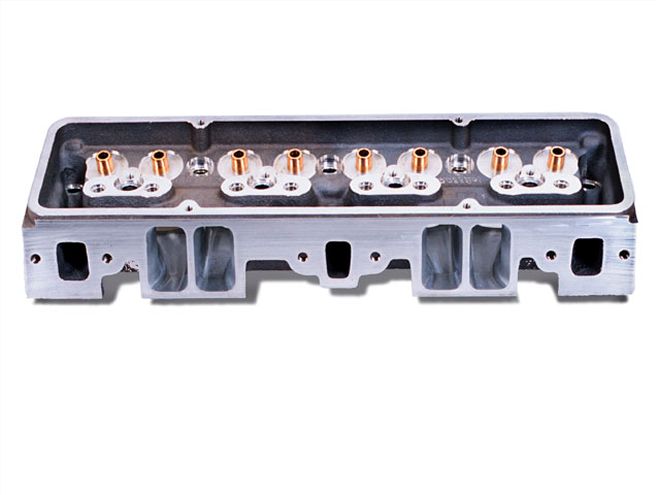
PRO 1 aluminum cylinder heads for small-block V-8s deliver advanced airflow technology at a very good price. Options include four intake runner sizes (180 cc, 200 cc, 215 cc, and 230 cc), two chamber volumes (64 cc and 72 cc), five valve diameters, and straight or angled spark plugs. Hardened exhaust seats and long-lasting mag-bronze valveguides extend cylinder head life. They use standard small-block pistons, headers, and valvetrain components and are bolt-on replacments for most conventional 23-degree heads.
Click here for a list of Dart cylinder heads
The Motown 220 Lite cylinder head from World Products is engineered for increased power, yet benefits from high-volume CNC manufacturing to keep prices in line with street heads. Some of the features contributing to the effectiveness of the Motown 220 Lite include intake runners with an improved short turn, optimum port consistency, and CNC-machined chambers. Cast from 355-T6 high-density aluminum alloy for added durability, all machining operations are registered off the combustion chambers to ensure proper centering over the cylinder. They are available bare or in complete assemblies.
Click here for a list of World Products cylinder heads